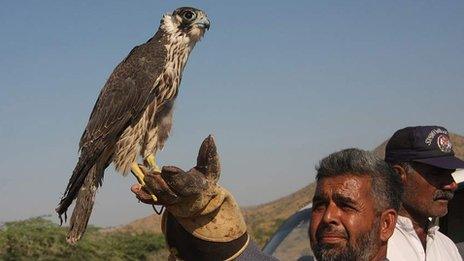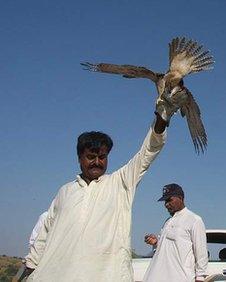Pakistan releases hunting falcons 'from Qatari royal'
- Published

Falcons are highly prized as hunters in Pakistan
Custom officials in the Pakistani city of Karachi have released 52 falcons that they say were unlawfully transported into the country.
Officials say the falcons were brought from Qatar by a member of its royal family without proper documentation.
They say another 22 birds have been handed back to the Qataris.
Members of Gulf royal families routinely bring in falcons for hunting birds and other animals in Pakistan, with government sanction.
The Qatari embassy was given several days to produce paperwork relating to the import of the birds - but customs officials say documents for only 22 could be furnished.
'Aphrodisiac'
Wildlife controller for Sindh province Saeed Baloch told the BBC's Riaz Sohail in Karachi that the remaining birds were handed back to representatives of Qatar.
"But the 52 falcons were later released into the wild in Kirthar National Park," Mr Baloch said.
Located just outside Karachi, the park has a variety of wildlife within its 250,000 hectares.

Falconry is at its peak at this time of year in Pakistan
Hunting is prohibited and officials say the birds will be safe there.
Wildlife experts said last week that some of the birds traditionally hunted by the falcons were endangered.
Among them is the Houbara bustard - believed to be widely prized throughout the Middle East as a quarry for falconers because its meat is valued an aphrodisiac.
Arab and local government officials, however, denied that any endangered species were hunted.
The falcons were being brought in at the start of the winter season, a time when bird migrations into southern Pakistan are at their peak.
Although locals are prohibited from hunting the birds, it is thought members of Gulf royal families are given special permission to do so.
Conservation groups say such licences are illegal and unprecedented elsewhere in the world.
Hundreds of thousands of Pakistanis are employed in various industries in the Gulf kingdoms, which also provide bailout loans and cheap oil to Pakistan's perpetually beleaguered economy.
For this reason, many see the licences as being in Pakistan's national interest, correspondents say.